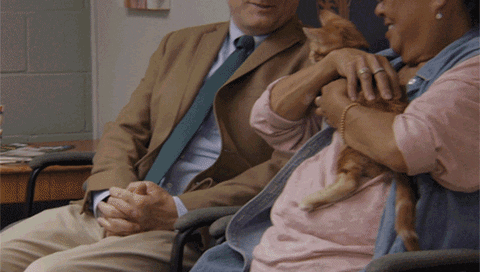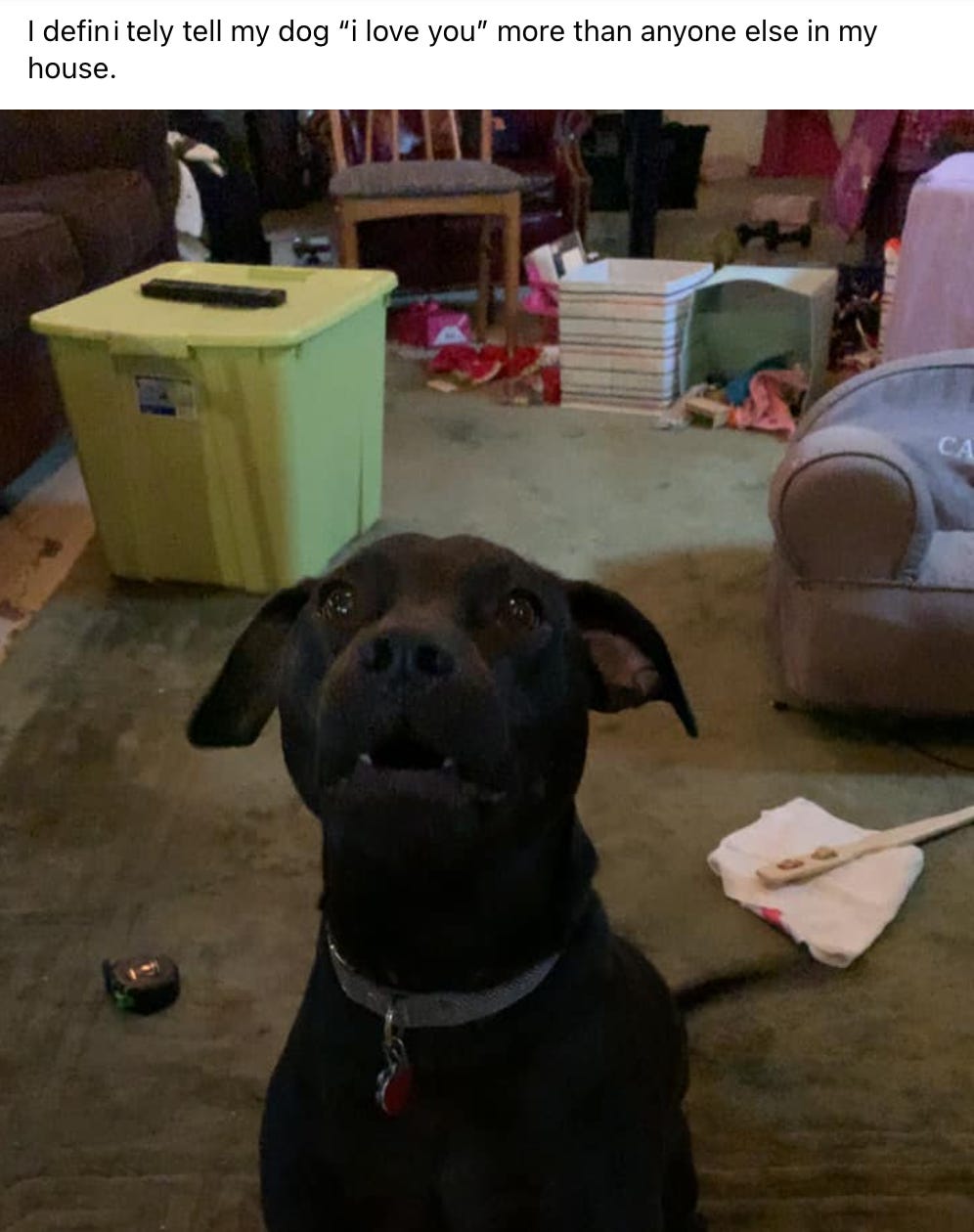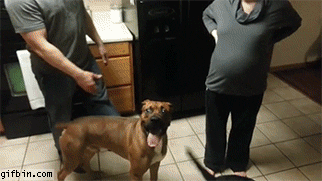One of the first big fights my husband and I had in our relationship was when my parents’ dog was getting old and I wanted to talk about his (the dog’s) imminent death. My then-boyfriend straight up refused to talk about it. It was too sad for him to discuss. I found this reaction upsetting. First, I had a big thing I wanted to process—and he, someone who knew the dog and my family, wouldn’t let me. I was also perturbed by his refusal to talk about it because I just figured that if you’re responsible enough to own a pet, you have to acknowledge you will likely supervise its eventual death. I felt like he wasn’t facing reality and he thought I was being mean, I supposed, which made me feel angrier and meaner. We were super pissed that night but, many years (and a few euthanasias later) he barely reacted when we brought home a new puppy in early 2020 and I mused about how this dog’s life will encapsulate the pandemic and the kids growing up, and it will be weird to look back at now when he’s at the end of his life. My husband thought it was a bit morbid that I was already thinking about the puppy’s eventual death but at least we didn’t yell about it.
Anyway, today’s issue is the first part of a fascinating conversation I had with California-biased veterinarian Jeni Goedken about some of the most complicated aspects of pet ownership. She is a second-generation vet with 20+ years in the field—I grew up with her and we still have memories of each others’ childhood dogs. Jeni specializes in at-home pet euthanasia, which is what I’m focusing on in this issue. When we spoke a few weeks ago she estimated that she performs a little over 50 euthanasias per month in folks’ homes.
Comments are off for this post because I know passions can run high when it comes to animal care and I’d rather not moderate. But if you know someone who is or will be struggling with end of life/quality of life decisions for their pets, please feel free to forward. Come for the helpful professional take on quality of life, and stay for some funny, sad, sweet and gross stories.
What do you tell folks about when it’s truly time to end a pet’s life?
That is one of the most difficult decisions to make as a pet owner, as well as a veterinarian to try to counsel. It doesn’t matter how much money you spend, how many tests veterinarians do, how many drugs we give out, how much you adore your pet, we are going to lose him. It took me about 12 years of being a vet to figure that out. I’m going to lose every single patient. It doesn’t matter what you do. Too many people feel guilty about not doing everything they think they “should,” because you can do everything you should and you’re still going to lose him.
As you are nearing the obvious decrease in quality of life, another thing to remember is animals are epic survivors, especially cats, but dogs too. As we know, there’s a difference between surviving and living, and that’s the disconnect. We see their quality of life go down while they’re just in survival mode. That’s why I’ve shifted to end-of-life care. A lot of times we are dealing with quality of life, but eventually, we need to start thinking about quality of death, because it’s going to come, period. We can’t stop that train from coming. And I’ve seen it too much in my career where people hold on, because it’s such an unnatural decision to make.
People say, well, he’s still eating and going outside but he’s dragging his huge tumor around. How much is eating and drinking an indicator of vitality in a very sick or old pet?
Because they’re still eating or their tails still wag, they’re having what’s really good moments in bad days. Then something catastrophic happens. Meaning, you wake up and they’re having seizures in the middle of the night or you come home and they’re down in pain, screaming. And then you rush that pet in and everything’s a blur and you leave the clinic without your pet. You never forget your last moments with your pet. It doesn’t matter if it’s in complete trauma, unexpected, if it’s a beautiful moment— you will never forget it, and can’t rewrite it.
This happened to me with my cat the year my twins were born. I waited too long, and I don’t know what I was exactly waiting for. Maybe it was to feel ready? But the thing is, no matter what you say, when that time come, you’re never ready. I ended up in the ER at two in the morning with this cat who got me through undergrad and vet school, and he was having seizures. And as I’m explaining to the veterinarian, “Yeah, I’m a vet, too. I’m just on maternity leave,” he has a seizure in my hands and falls out of my hands and hits the ground. That was in 2009, four months after the boys were born. And it doesn’t matter how many peaceful goodbyes I give, the guilt of feeling like I waited too long and his last moments were in pain or confused or not at home where he belonged, that’s always going to haunt me.
So stepping in a little earlier to make it as good for your pet and for your family as possible is actually a gift to everyone. Again, it’s never going to seem natural to make that decision, period. And you’re never going to feel ready, period.
Eating and drinking is a tough one because, especially large breed dogs, their bodies will give out before their spirit. Their hips will be out and they can’t get up, but I walk into a home and they’re wagging their tail and they’re trying to grab their ball and they’re eating up a storm. So eating and drinking don’t necessarily mean the quality of life. Kidney disease in cats is one when people go, “Well, he’s still drinking—he’s drinking a lot.” The reason is, is he’s really dehydrated. So trying to throw the eating and drinking away and looking at your pet without those factors in mind, I think can help a little bit.
How does the sadness of your work not get to you too bad?
I get that a lot. Even my husband was like, “You want to do what now, all day, every day?” I’ve been out of school for 16 and a half years. Coming right out of vet school, there was no way I would ever even think about this job. I was like, “I’m going to help animals!” “But again, going back to experience and perspective, it doesn’t matter what I do. The day will come that we will always have to counsel people in their grief and their loss. And that’s not saying that vetinary medicine isn’t worth it, but for me, I think the ending and the beginning are two of the most important parts of that pet story.
And what I do is I get him really high. I give him morphine and Valium and they just drift away wherever you want them to be, privately while I’m watching on from the other room before we take away his last breath.
A lot of people are worried about euthanizing too early. If I don’t think it’s time, long story short, I don’t proceed. And I have turned down euthanasias before. It’s awkward as hell. But if there is something that’s going to make me walk away from that house or not sleep well that night, I won’t do it. We’re not like, “Show us the pet and we’ll inject them.” So I hope that gives people a little bit of perspective about doing it too early.
What do you advise parents with regards to talking to their kids about their pets’ death?
I let people know, it’s just like with any other thing with parenting: you’re making the best choice you can. So looking back, do not beat yourself up. There’s a lot of other things we’re going to put our kids through therapy. But with my experience, being honest is so key.
Now, there is age appropriateness. I would think the two and under phase, I don’t think they really need to be a part of it. They will ask incessant questions, especially the girls, and not quite understand, “Where’s Fluffy?” And then you tell them and you cry. And then the next day they’re like, “Okay, where’s Fluffy?” It’s just like Groundhog Day again and again. That’s more developmental on their age, because most of the time you’re trying to explain their first real foray into death.
What to remember is even when grandparents and stuff die, they’re not usually a part of their everyday existence, and that pet is. So many people are like, “Why am I grieving this more than like my dad?” They are in your home. You open the door, they’re there. You close your eyes, they’re there. You open your eyes, they’re there. They’re part literally of your everyday life. Acknowledging that and being like, “Yeah, it’s going to be completely rough,” is key. So with little kids not understanding the permanence of why Fluffy’s not there, just be prepared to have to reinforce over and over. Just because they keep asking doesn’t mean you’re doing anything wrong. That mindset of theirs just can’t understand. I have a list of kids’ books on the topic that are fantastic. [ed: see below.]
For kids maybe seven or eight and over, I feel like talking more as an adult is key and acknowledging that it’s going to be hard. “We’re going to be sad. There’s no way around it. And it’s okay. You’re going to see mom cry. You’re going to see dad cry. You’re going to cry. You’re going to be angry.” Just saying it as a statement is really helpful because you’re not even validating their feelings, you’re just letting them know your feelings so they can try to connect with that.
One major thing is that I don’t say “put to sleep.” I do it in two steps. I do the first step where I put the dog or cat under anesthesia with a whole bunch of good drugs. So I say it’s anesthesia and then I directly ask the kid, “Do you know what anesthesia means?” I make sure they know it’s a doctor’s sleep that only doctors can do with their doctor's medicine. One of the biggest things I see is kids hearing “sleep,” and then they’re afraid at night to sleep because they’re afraid they’re going to pass.
When it was time for our last cat Bogey to be euthanized in 2017, he was my first home euthanasia, because of what had happened to Yoda, my cat before. I looked at my husband that day and I was like, “We’ve got to say goodbye to Bogey today.” And he was shocked because he was like, “He’s still eating. He’s still drinking.” But he was in heart failure. He was diabetic. I pulled him out of a crisis. I know heart failure is one of the worst ways to go. He was tired. I said, “I don’t want to wait until he’s not eating and drinking and ends up in the ER like our other cat. If that happens again, I don’t know if I can be a vet.”
So my kids were like seven, six and a half. I was honest with them. All four of us cried. They were asking why don’t cats and dogs live as long. And the honest answer is, I don’t know. That’s just how God made them. I wish they would, but they don’t. Because I was the one pushing the drugs, I did not let them watch because I didn’t want them to have that aspect of “…and then Mom killed him.”
Do you acknowledge the rainbow bridge?
If I never hear those words again, I would die happy. Now, that being said, I know my audience.
You’re not going to be like, “Shut up. That’s dumb.”
I know. “There’s no bridge!” So many people are like, “When you die, there’s going to be seven million dogs and cats running towards you, Dr. Jeni.” And when they say that, really inside I’m like, “Okay, lady.” I will be, as I always say, fluffy. I will be totally as fluffy as you need me to. If that’s what brings you comfort, then go for it. That’s the thing I tell people. Even after a dog is under anesthesia, I’m like, “You’re a good boy.” I tell people, I’m like, “Listen, I know he’s under anesthesia. The doctor in me knows he cannot hear. He cannot feel. But I’m still going to talk to him because if there’s a chance he can feel my energy or something because we’re only human. We don’t know everything. I want him to know I’m still respectful.” If I’m wrong, so be it. It’s mixing this spirituality with science, but I love that.
Do you then take the deceased animals away in your family car?
I go from beginning to end. If you want me to take your pet for cremation, you can to put him in the car. It is my family SUV and it is fluffied out. I mean my license plate has hearts and paws on it. It’s pretty ridiculous. My husband hates driving that car. And then they actually come home with me. I have an area of my attached garage that is climate controlled just for my patients. I keep them with me until the crematorium comes to my house three days a week because I want to personally hand them off and make sure there are no discrepancies. That’s a lot of technical stuff because we’re dealing with after-death stuff.
And that’s why, long story short, I keep a really good beer collection for my husband. Because when I’ve got a big dog in the back of the SUV, guess who has to help me carry that dog? He is not a pet person. I mean, to say that is an understatement.
And the kids just roll with it? Do they know they might be in a car that had a dead Mastiff in it a few hours ago?
Now I say it jokingly because they’re older and they’re pretty mature, but they don’t care.They’re never in the car. They never see any of that stuff. They know when the garage door opens not to come out to the garage to ask me something stupid about video games, because I’m probably opening the door and there’s a dead dog in the car. So they know little things like that where the dogs are kept are covered. They’re all wrapped up too. So no, my kids are not affected. We don’t make it a big deal. We’re just like, “When the garage door opens, don’t come out unless I come in, unless something someone’s bleeding.
What’s something funny and gross that’s happened at work recently?
There’s a lot of gross stuff. I had a dog for home euthanasia, and he had these wounds, and yes, that happens. But he had maggots in them. And this old lady did not even realize it. She was a little senile. And the thing is, that dog has to go in my car.
Oh, no.
Most of the animals have to touch my car. Even though there’s a stretcher or something in between, when it’s fleas or maggots, in my head the whole time I’m like, “Crap, how am I going to get this dog in?” Because I don’t want to put it in a bag in front of the owner because I’m still trying to keep it sweet. But I’m like, “Oh, shit. If I have maggots or fleas all over my car. That’s not good.” So yeah, I would say lifting the maggot dog onto the stretcher was gross. And then having that maggot dog in my car. But you’d better believe I pulled over to the first church that saw with an empty parking lot in the back and put that dog in a bag.
Here’s a cute one. There were two kids at this euthanasia and one of them was probably seven and was like, “What do you think he’s thinking about now?” The dog was under anesthesia and I was talking them through it. I was like, “That’s a great question. I want to think that he’s thinking about all the stuff he loves the most.” And this seven-year-old was like, “Oh, like chasing squirrels?” I was like, “Yes, if he loved to do that.” And the little four-year-old boy was like, “Well, then he should be thinking about me.” He puts his face in front of the dog’s clearly almost-dead face like, “Barney, are you thinking about me in there?!” I was just like, “Oh, my God. Do not laugh. Do not laugh.”
Dr. Jeni’s recommended books about pet death for kids
Ages 3-5:
Being Brave for Bailey, by Corey Gut
Ages 4-8:
Addy’s Cup of Sugar by Jon J. Muth
Dear Brave Friend by Leigh Ann Gerk
When a Pet Dies by Fred Rogers
Dog Heaven and Cat Heaven by Cyntha Rylant
Ages 6-9:
The Tenth Good Thing About Barney by Judith Viorst
For Every Dog an Angel and For Every Cat an Angel by Christine Davis
Ages 4-12:
Sammy in the Sky by Barbara Walsh
Dr. Jeni adds, “There are many books about grieving a pet for adults. But I find the best thing to do is talk to others who are going through it. Free online support forums are the best, because you can remain anonymous and private, and if it gets too woo woo or heavy you can click out. One of the best ones is offered by the Association of Pet Loss and Bereavement, because they offer chat room, video rooms, and even anticipatory grief chat for people in that dreaded is it time phase. More info here.”
End credits
I hope you enjoyed today’s issue of Evil Witches, a newsletter for people who happen to be mothers. If you haven’t yet I hope you consider becoming a paid subscriber, which supports the time it takes to conduct, edit and publish pieces like these and gets you extra subscriber-only content and chat threads covering everything from the helpfully mundane to the stupid and silly to the odd personal crisis.
If you have any questions, feedback, or suggestions for the newsletter you can reply to this email or talk to other witches on Twitter. I always appreciate a shout out social media, like so:












